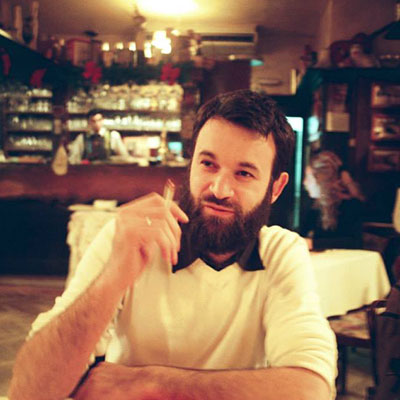Reading Ivan Velisavljevic’s biography may make you think he is a man who constantly writes and rarely sleeps. He has graduated from two faculties, departments of dramaturgy and literature, he has contributed to many publications and websites, he wrote and co-directed documentary road movie The Road to High Earth (2006), he writes prose, poetry, and deals with literature and film criticism. He is one of the people responsible for a notable attempt of establishing a strong platform for young film critics through Novi kadrovi (New Frames) in the mid-2000s. He was very kind to discuss film criticism in general, as well as film criticism in the Balkan framework.
Considering that many screenwriters often feel some kind of aversion towards the film critics, how did you manage to reconcile the screenwriter and the critic in you?
In his new book The Rhapsodes: How 1940s Critics Changed American Film Culture, David Bordwell, probably the greatest living filmologist, writes about Otis Ferguson, James Agee, Manny Farber and Parker Tyler, saying the one key point: for these four maestros, film criticism was always something more than an “ephemeral observations and displays of taste”. I think the aversion emerged from such apprehension, which implies that film criticism is reducible to those two things, and film critics are greatly responsible for such apprehension. Another thing is understanding film criticism as a trench warfare between the creatives/authors and consumers/parasitic critics. However, I don’t think criticism should be primarily grading, evaluation, moving from announcements of death sentences to giving medals, and I don’t think it is a parasite profiting from someone else’s effort and creative forces or parasite profiting by the ones who don’t have such forces. Just like Bordwell wrote, I think the best film criticism is creation, education and communication at the same time, watching films by other means. Creation, because it points out the critic’s personality, worldviews, specific and impressive style of writing, skills of perception, synthesis, original approach… Communication, because the critic talks both to the film author and audience, which is obvious, but it is also communication with yourself, your own criteria, prejudices… And, of course, education, because it is an attempt of understanding the ways films work and tell stories. In all of this, I don’t see any drastic difference in the work of screenwriters and critics.
For how long have you been working as a critic and what has changed since in critics’ circles?
I’ve been writing critiques professionally for ten years and during that time, if I focus to Serbia only, things have changed for worse. Critics’ circles, which still existed during mid-2000s, and which we tried to rejuvenate with the project New frames (Novi kadrovi), do not exist anymore. First of all, it happened because all of those people who ran the cinema institutions, as well as we, the guild members, haven’t managed to create and sustain relevant places for publishing criticism, but, what’s more important, a place where the quality of criticism improves, where the dynamics of the scene grow through debates, educational programs, arrival of the new generations, but first of all, a place where the seriousness and competence of the critics are maintained at a high level. Now there is a chance for that to change, because some new people became heads of the most important film institutions in Serbia, and there are also several names from younger and middle-aged generations of critics who could initiate this change. Only when some kind of solid basis is established, we can expect the upgrade as aesthetic discussions and influence on film praxis.
Do critics from the Balkans cooperate enough?
There is never enough of cooperation, but it definitely exists, primarily because of the mutual core of Yugoslav cultural space and film. Throughout this year, if I speak only about the projects I am involved with, I’ll speak at the Festival of Screenplay at Vrnjačka Banja, at the promotion of YU Film Lexicon by film critic Nenad Polinac from Zagreb, I will write reviews for the festival publication of DokuFest in Prizren, post-Yugoslav film will be the topic of the symposium in Slovenian cinematheque in October, while a monograph about Hajrudin – Siba Krvavac is being prepared in Sarajevo, and the texts will be written by critics from Croatia, Serbia, Bosnia, Slovenia… The Internet, festivals and co-productions of former Yugoslav republics certainly accelerate this cooperation and make it easier, and I hope it will only be improved and expanded to the other Balkan countries. Especially because Balkan film (if we look at the Balkans geographically, from Triglav to Bosphorus and from the Carpathians to Adria) is among the most relevant cinemas in the world in the last 25 years – films from ex-Yugoslavia solely have won the main awards on each of the three most important festivals in Europe, as well as an Oscar. When we add up films from Romania, Greece, Turkey, we will see how significant Balkan cinema is in the entire world. Considering mutual history, cultural influences, numerous contemporary co-productions and economic bonds, I don’t see any reason for critics from Balkan not to cooperate even more, first through conversations and analysis of the current films from the region, but also through conversations about tendencies of Balkan film in the past twenty or so years. And, of course, about its future tendencies.
Are there any significant changes in the Serbian cinema during the past several years and what kind of changes would you like to see? Also, what kind of change would you like to see in the domestic film criticism?
I see changes in the production, but I don’t see them where they are the most important – in the domain of aesthetics, style, author’s policy. I would like to see the authors raise their criteria and ambitions when they make a film, to see their self-strictness, and to see more relevant, more complex, more courageous films than the ones I am watching during the last several years. Except for the well-organized cinema, one of the main conditions for that to happen is exactly the activation of film criticism – to which I wish the same changes regarding ambitions and quality as film praxis, primarily, not to be a trench warfare and fight between vanities, but basically a dialogue constructive for the film aesthetics, maybe sharp, but reasoned, principled and uncomfortable.
What is the greatest advantage and what is the greatest flaw of being a critic in Serbia?
The advantage is that you can see a lot of movies for free, while the flaw is that you cannot survive as a critic.
How much does the situation with reduced freedom of media influences the freedom of film criticism? Are there any channels where a critic is free to write anything?
It would be excellent if film criticism was fighting censorship because that would mean that there is a relevant space for it to be published, read and capable of influence. The Internet is, of course, the channel where a critic can publish anything, but the fact that there are not many coherent critics online tells us that the essential issues are not censorship, freedom of choice or possibility of publishing, but the fact if you have to say something and if you know to say it persuasively.
What would you recommend young critics to read/watch?
The book by David Bordwell I’ve mentioned earlier, it was released recently and it can be bought online. Besides that, I think Bordwell’s book Making Meaning is still essential for any film critic, although it was written in 1980s. When it comes to films, I always recommend young critics to see the program of Cinematheque.

